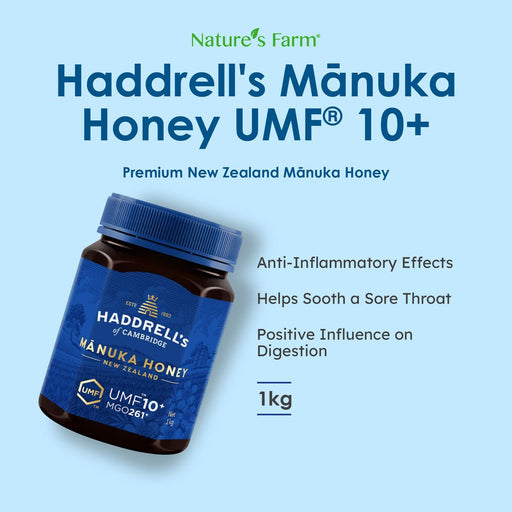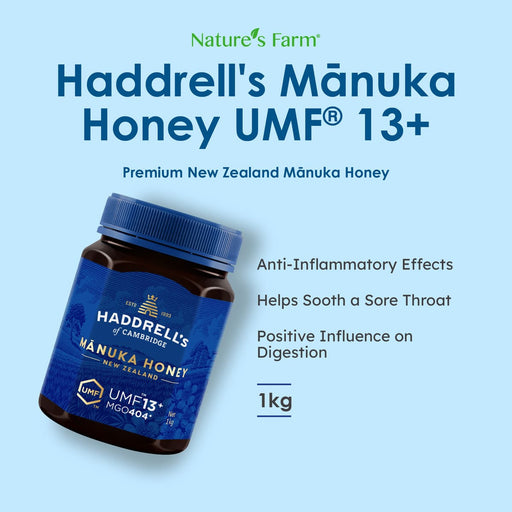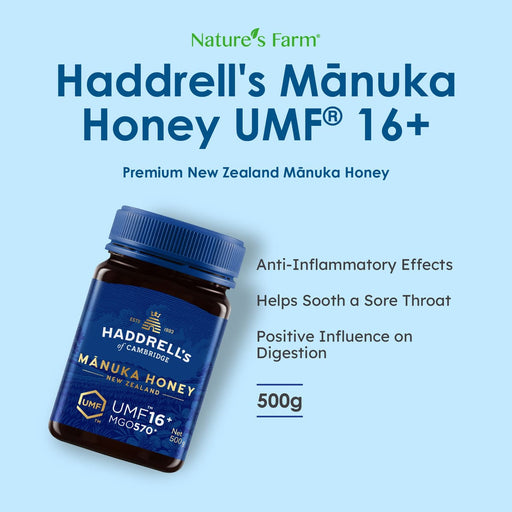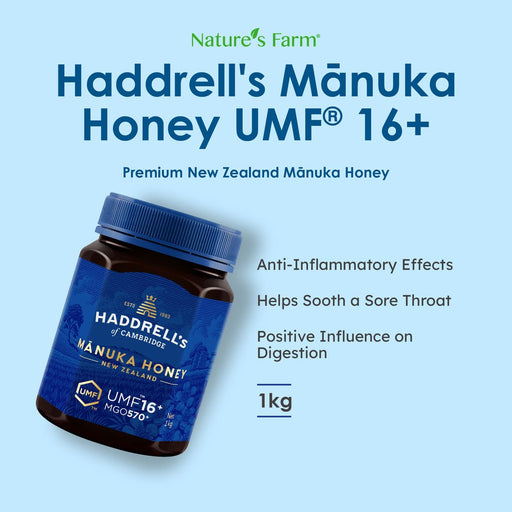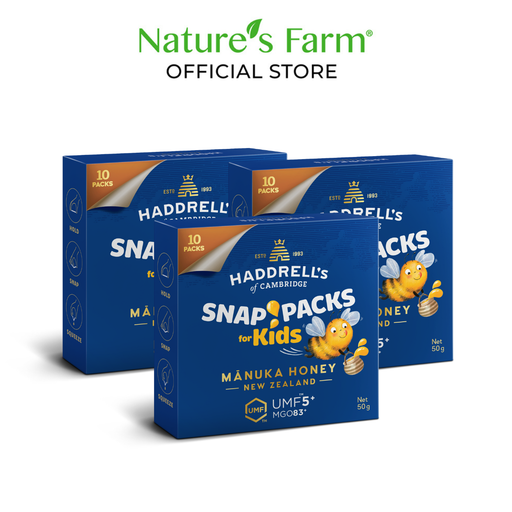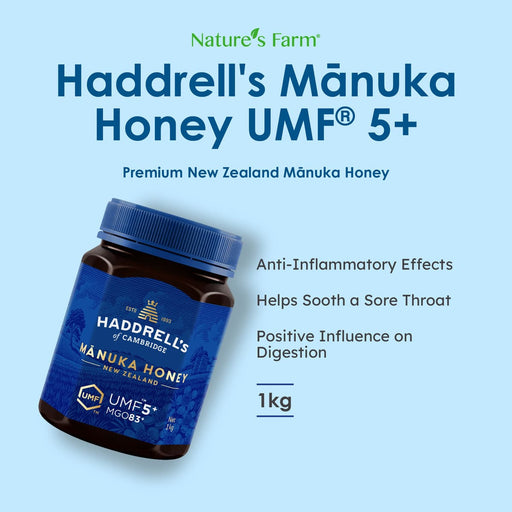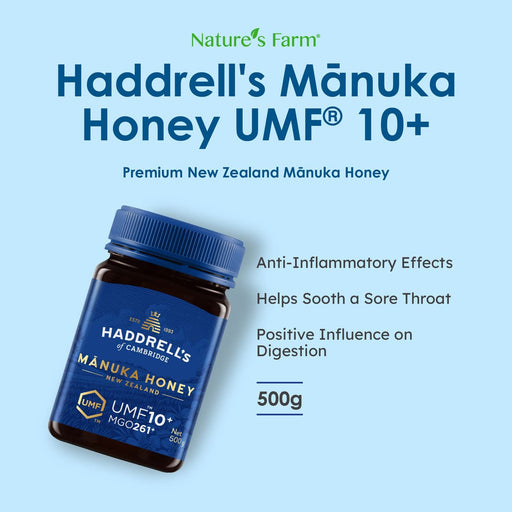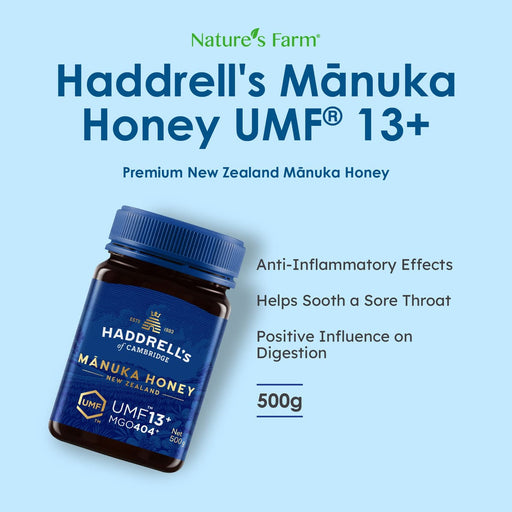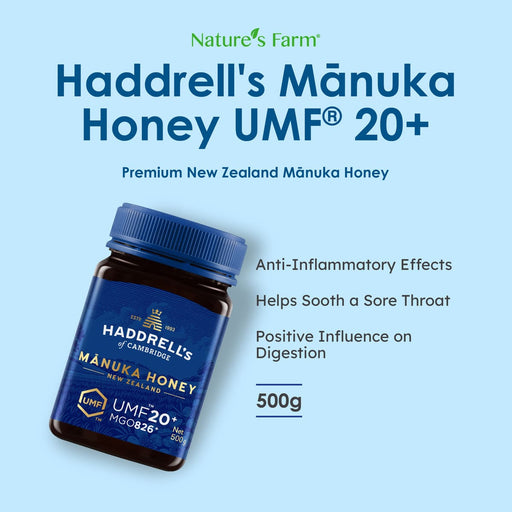
Manuka Honey
Common FAQs on Manuka Honey
Honey has been used throughout history in folk medicine for the goodness of its health benefits and medical uses. Other than helping to heal wounds and fight off infections, honey is also a tasty but healthier alternative to regular sugar. Yes, that’s how exceptional this glorious thick golden liquid is.
However, you may wonder what the best type of honey is among the lot? No prizes for guessing that the winner is hands down the “ever-popular” manuka honey!
1. What is so special about Manuka honey?

Image Credit: healthline.com
2. What is manuka honey UMF and MGO?
Manuka honey comes in two ratings, UMF and MGO. Honey producers choose between the two scores to mark the beneficial characteristics of this on-demand product.
Honey labels with UMF or MGO ratings are, therefore, lab tested to identify them as genuine manuka honey. The higher the grade, the higher the health benefits.
3. What is the difference between manuka honey and regular honey?

Image Credit: draxe.com
- Manuka honey is more potent than standard honey because it has higher levels of MGO. Unlike raw honey, manuka has special antimicrobial properties, making it bacteria resistant.
- The nutritional content of manuka is approximately 4 times that of regular flower honey.
- The presence of UMF also sets manuka apart from conventional kinds of honey.
- Therefore, it is useful in treating many health conditions, including skin blemishes and wounds.
4. Can you put manuka honey in tea?
Manuka honey can be taken off the spoon without diluting, or by adding it to cold or warm drinks. Note not to put it in boiling water as doing so would kill most of the honey’s active enzymes.
For every 1-2 teaspoonful of manuka honey added to a cup of tea, stir, and drink it cold or warm. The product acts as a sweetener in tea and can also be added to other daily routines easily.
5. Can I take manuka honey every day?
To gain from the digestive benefits of manuka honey, you should take 1-2 tablespoons of the product every day. You can eat it directly without diluting, or you can add it to your drinks or food.
Taking ½ to 1 tablespoon of manuka honey daily is right for your immune system. You may also take manuka honey to ease a sore throat.
6. Should manuka honey be refrigerated?
You do not have to refrigerate manuka honey because it has antibacterial properties, giving it a long shelf life at normal room temperature.
Storing the honey in the refrigerator would crystallize it, making it lose its natural flavor and taste. Instead, seal it tightly in its original bottle in a cool, dry place, away from exposure to direct sunlight. Doing so can preserve your manuka for years or even decades.
7. Does Manuka honey expire?
Honey does not rot or go bad. You can store it for thousands of years without spoiling.
During this time, it may change color or form into crystals, but its health benefits would remain intact. Make sure to keep it away from moisture.
8. Which grade works for what types of health conditions?
- A 10+ or higher certification for UMF® Manuka honey indicates that the product is suitable for medical and therapeutic use. It carries beneficial compounds with antibacterial and health benefits for healing wounds and staph infections. It can also treat acne and scarring.
- For everyday health or energy boost, take manuka honey with a UMF rating of 10+ to 16+.
- If you need extra body support or if you are suffering from a severe condition, then you should take more potent manuka with UMF 16+ rating.
9. Is it bad to eat too much manuka honey?
Manuka honey is usually safe to eat in unlimited quantities. However, there are still side-effects of eating manuka honey for certain people:
- A spike in blood sugar if taken orally especially for those who suffer from diabetes. For example, type 1 to type 2 diabetic patients.
- Those who suffer from an allergic reaction towards bees. For example, symptoms from a manuka honey allergy may resemble common pollen. Not receiving treatment can cause serious complications
- Manuka honey should not be given to babies younger than one as they may be prone to a risk of infant botulism, a food-borne illness.
10. Why is Manuka honey more expensive?
- Manuka honey is a rarity since it is an original production from New Zealand.
- Higher health benefits compared to regular honey. For example, it is a superfood due to the addition of its active bacterial-fighting manuka pollen.
- It has a well-known reputation due to being termed as "the elite of the honey world". This is due to manuka honey being the best premium quality honey that you can find in the market.
- Prolonged use of manuka honey has boosted up the immune system and cured digestive ailments such as acid reflux. Also, it is used to relieve sore throats and coughs.
- Tastes superb and heavenly either eaten on its own or mixed with a glass of warm/chilled beverage.
11. Is Manuka honey good for acid reflux?
Yes, Manuka honey is the bee’s-knees for fighting acid reflux. This is due to the antibacterial properties in it that can help to reduce harmful bacteria that commonly causes inflammation in the stomach and gut.
12. Is Manuka honey good for your skin?
For those who suffer from facial skin problems such as acne, manuka honey helps you to keep your complexion clear, translucent, and pimple-free. This is due to the special anti-inflammatory ingredients in it that work wonders in maintaining your skin PH levels to the most ideal state.
13. Does Manuka Honey fight infection?
Besides acting as a healthy natural food substance, manuka honey is used to fight various skin-related infections such as burns, ulcers, and wounds due to its highly potent antiseptic properties.
14. Can diabetics eat honey?
While anyone above the age of one can eat manuka honey, people with diabetes should consult their doctor before consuming the product.
This honey can help to heal diabetic ulcers, but it is high in natural sugar. It can, therefore, affect blood sugar levels.
15. How do you take manuka honey for a cough?
The recommended dosage is 1 teaspoon 1-3 times per day. Also, refrain from administering manuka honey to infants under 1.
16. How do I use manuka honey for sinus infection?
Manuka honey dries out the moist biofilm built by sinus infections. Its antibacterial properties can penetrate the sinus chambers.
Add 1 spoonful into your drink to derive the best results.
17. Is Manuka honey good for kids?
Although it is not recommended to give Manuka honey to kids under the age of 18 months, it is still okay to feed them with a 100% natural kids formulated version of the Manuka Honey syrup.
18. Is Manuka honey good for arthritis?
Studies have shown that drinking a glass of manuka-honey based beverage can relieve or cure arthritis pain completely. This is due to the high antibacterial properties that it possesses.
19. Is Manuka honey good for blood pressure?
High blood pressure leads to heart disease, so manuka honey can help to lower it. This is because it contains an active ingredient called "acetylcholine". For example, "acetylcholine" is used to lower blood pressure, improve blood circulation, and protect the liver altogether.
20. Is Manuka honey acid or alkaline?
All forms of honey are acidic with a PH average between 3.2 and 4.5. Here, Manuka honey is no exception.
21. How do you know if Manuka honey is credible?
Real aka genuine Manuka Honey “must only” be 100% of New Zealand origin. If it comes from somewhere else, you are definitely not getting the real deal.
22. What should I look for when buying Manuka Honey?
- Look out for the MGO rating number alongside the trademark UMF. For example, the MGO scale starts around 30 and goes up to 840. The higher the MGO number, the stronger the microbial properties in it.
- Look out for the quality trademark UMF stated on the front label as this is an important factor.
- Look out for the official UMF Release Certificate. For example, each bottle of manuka honey is certified and approved by the New Zealand government.
- Look out for the New Zealand licensee's brand name and license number on the label. For example, each bottle of manuka honey should have a number on the side of the jar showing the level of active compound, methylglyoxal.
23. How can you tell if Manuka honey is real?
- Real, pure manuka honey has a creamy, thick and gel-like texture.
- Real manuka honey does not harden easily when refrigerated.
- Real manuka honey settles at the bottom while fake honey dissolves easily.
- Real manuka honey can withstand the thumb test. If it spills or spreads on your thumb, then it isn’t pure.
References:
ManukaHoney. 2020. Bringing The Best Of New Zealand To The Customer. [online] Available at: https://manukahoney.co.uk/info/faqs [9th June 2020]
WebMD. 2020. Manuka Honey Medicinal Uses. [online] Available at: https://www.webmd.com/a-to-z-guides/manuka-honey-medicinal-uses [9th June 2020]
Healthline. 2020. Manuka Honey Uses Benefits. [online] Available at: https://www.healthline.com/nutrition/manuka-honey-uses-benefits [9th June 2020]
Haddrell's of Cambridge Manuka Honey UMF® 10+ 1kg
The Haddrell’s Story Haddrell's of Cambridge® is one of the longest standing producers of UMF™ Grade Manuka Honey. It was established in 1993 by R...
View full detailsHaddrell's of Cambridge Manuka Honey UMF® 13+ 1kg
The Haddrell’s Story Haddrell's of Cambridge® is one of the longest standing producers of UMF™ Grade Manuka Honey. It was established in 1993 by ...
View full detailsHaddrell's of Cambridge Manuka Honey UMF® 16+ 500g
The Haddrell's Story Haddrell's of Cambridge® is one of the longest standing producers of UMF™ Grade Manuka Honey. It was established in 1993 by ...
View full detailsHaddrell's of Cambridge Manuka Honey UMF® 16+ 1kg
The Haddrell’s Story Haddrell's of Cambridge® is one of the longest standing producers of UMF™ Grade Manuka Honey. It was established in 1993 by R...
View full detailsHaddrell's of Cambridge Manuka Honey UMF® 16+ Lozenges Original, 8s
Haddrell's of Cambridge was established in 1993 by Richard and Moira Haddrell with a great passion for honey and fifteen beehives. Cambridge is a s...
View full detailsHaddrell's of Cambridge Manuka Honey Snap Packs for Kids UMF® 5+ 5g
Highly prized for its unique properties, many people around the world believe in the power of genuine UMF™ mānuka honey from New Zealand. Kids love...
View full details[Bundle of 3] Haddrell's of Cambridge Snap Packs for Kids UMF 5+ Mānuka Honey
Highly prized for its unique properties, many people around the world believe in the power of genuine UMF™ mānuka honey from New Zealand. Kids love...
View full detailsHaddrell's of Cambridge Manuka Honey UMF® 5+ 1kg
Haddrell's of Cambridge was established in 1993 by Richard and Moira Haddrell with a great passion for honey and fifteen beehives. Cambridge is a s...
View full detailsHaddrell's of Cambridge Manuka Honey UMF® 10+ 500g
The Haddrell’s Story Haddrell's of Cambridge® is one of the longest standing producers of UMF™ Grade Manuka Honey. It was established in 1993 by...
View full detailsHaddrell's of Cambridge Manuka Honey UMF® 13+ 500g
The Haddrell’s Story Haddrell's of Cambridge® is one of the longest standing producers of UMF™ Grade Manuka Honey. It was established in 1993 by ...
View full detailsHaddrell's of Cambridge Manuka Honey UMF® 20+ 500g
The Haddrell’s Story Haddrell's of Cambridge® is one of the longest standing producers of UMF™ Grade Manuka Honey. It was established in 1993 b...
View full details
Enjoy Free delivery with min. spend

Discover Online Exclusive deals

Your information & Payment is safe with us

Chat with our experience advisors



